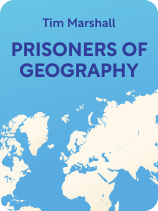

This article is an excerpt from the Shortform book guide to "Prisoners of Geography" by Tim Marshall. Shortform has the world's best summaries and analyses of books you should be reading.
Like this article? Sign up for a free trial here.
Why are the economies of Northern Europe stronger than those of Southern Europe? How does global warming impact trade routes? How is Tibet geopolitically important?
Prisoners of Geography by Tim Marshall is about how geography shapes the development and politics of nations. Marshall’s aim is to help readers gain a deeper understanding of global politics and conflicts by detailing their geographical underpinnings.
Continue reading for an overview of this eye-opening book.
Overview of Prisoners of Geography by Tim Marshall
Published in 2015, Prisoners of Geography by Tim Marshall is one of several geography books Marshall has written for general audiences. In addition to writing about geography, Marshall is a journalist with over 20 years of experience covering wars and other international affairs.
We’ll explore Marshall’s understanding of how geography shapes our world. We’ll first examine how geography impacts individual nations. In particular, we’ll study how natural resources, the geographic distribution of population groups, and borders impact a nation’s development and internal politics. We’ll also learn how modern technology allows different regions to alter or overcome their geography. Then, we’ll consider how geography shapes international relations, focusing on how nations compete for energy, trade routes, and military influence over key geographic areas.
Geographic Features Determine a State’s Development and Internal Politics
Marshall argues that much like the starting hand in a card game, the geography of a region determines how its politics and economics develop. If it’s dealt a naturally winning hand, filled with natural resources and defensible natural boundaries, it’s likely that it will develop into a stable, successful state. On the other hand, if a nation’s hand includes poor-quality land, warring populations, and poorly drawn borders, it’s likely to experience difficulty and internal conflict.
(Shortform note: Not only does geography shape the politics of entire nations, but it also influences the political leanings of individuals within those nations. Research has shown that individual political identity is shaped by the beliefs of others in your region. Individuals tend to align with the dominant political group in the region they live in, regardless of how closely their beliefs actually mirror that group’s ideology. According to these findings, your political party may have more to do with where you live than what you believe.)
In this section, we’ll consider the factors that shape a nation’s internal politics. We’ll examine how geographic features influence development, how the makeup of a population shapes politics, and how borders that ignore geography can lead to internal strife. We’ll also learn how modern technology allows nations to overcome and in some cases change their geography.
Geography Influences Development
The geography of a nation influences when and how it develops. Nations with more natural resources, trade routes, and defensible boundaries are able to develop relatively rapidly and safely. On the other hand, nations that lack resources, trade routes, and secure boundaries tend to develop more slowly and suffer instability.
For example, Marshall notes how northern European nations, such as France and Germany, have higher volume and quality of farmland as compared to their southern neighbors. As a result, Marshall claims, the northern nations have developed more robust economies, whereas southern European nations such as Italy and Greece have been more prone to recession and unemployment as their economies continue to develop.
However, while natural resources help nations to develop, they can also incentivize other nations to invade. As an example, Marshall notes that in spite of the inhospitable terrain that makes it difficult to invade African nations, European nations chose to invade and colonize anyway because of the immense wealth of precious metals, gems, and other resources that the continent possessed.
Trade Routes Shape Development
The presence or absence of safe routes for trade and transportation also shapes a nation’s economy and relationships with other nations as it develops.
As an example of the relationship between trade routes and development, Marshall describes how the geography of Latin America has impeded its nations’ efforts to grow and connect to one another. Specifically, Marshall argues that, aside from their coastal regions, many Latin American nations have few resources, with interiors that are difficult to traverse and plagued by disease-bearing mosquitos. As a result, while Latin America has cultivated many large, successful capital cities, they’re all located on its coastlines, isolated from each other and the rest of their countries.
Geography Leaves Some Nations Unprotected
A nation’s geography also determines how susceptible it is to invasion. According to Marshall, countries that have weaker natural defenses tend to have their development frequently and violently interrupted.
To illustrate how a nation’s geography can leave it vulnerable to invasion, Marshall looks to Korea’s geography. Caught between the regional powers of Japan, China, and Russia, the Korean peninsula has few natural boundaries to prevent invasions from either land or sea. As a result, Korea has been colonized and invaded numerous times throughout its history.
Human Geography Shapes Nations
Just as the distribution of natural resources shapes a nation’s development, the geographic distribution of people within a nation can shape its politics. As Marshall notes, the dynamics between the various groups within a nation can affect its culture, policy, and conflicts.
Marshall argues that, when religious or ethnic groups who have historically engaged in conflict exist in the same geographical area, it often leads to conflict. According to Marshall, these kinds of conflicts are also likely to occur if a nation attempts to annex areas controlled by groups of people belonging to another ethnicity or religion, as those groups assert their desire for autonomy.
For instance, as China has colonized the Xinjiang region, it has been met with sometimes violent resistance from the people of the region. Since their annexation, the Uighur Muslims of Xinjiang have protested continually, demanding that they be allowed to self-govern.
On the other hand, Marshall contends that in some cases, minority populations within one nation may become a strategic asset for another nation. For example, as Russia seeks to expand its influence across Europe, it often cites a desire to protect the interests of Russian minorities in other countries. These populations give the Russian government a foot in the door in politics and negotiations throughout the region.
Borders That Ignore Geography Lead to Internal Strife
As evidence for the power of geography, Marshall describes the disastrous consequences that ensue when humans ignore geography. Specifically, Marshall argues that, when humans draw borders that ignore both geography and the geographic distribution of different populations, violence and tragedy result.
As an example, Marshall cites the many borders European colonists drew during the plundering of Africa. These borders often included various groups from wholly separate cultures with no common interests and histories of conflict. Down the line, as a result of these poorly drawn borders, sectarian conflict and civil war would become common throughout the continent, as feuding groups were forced to coexist within artificially created countries.
Modern Technology Can Overcome Geography
While geography has been a historically powerful influence in shaping nations, according to Marshall, modern technology can be used to change and overcome geography.
To demonstrate how technology can be used to overcome geography, Marshall describes the impact of modern energy technology in the US. While the US has historically struggled to supply its own energy, advances in technology have allowed it to access its own massive reserves of liquid natural gas. As a result, the US is increasingly energy independent. While it once relied on foreign oil—and fought wars and wrote policy to defend its interests in that oil—its policy has shifted away from this focus as it has gained the ability to generate energy domestically.
Global Warming: Technology’s Unexpected Geographical Impact
Since the massive advancements in technology that came with the Industrial Revolution, human behavior has contributed to global warming. As Marshall notes, global warming is actively changing the geography and politics of the world.
Marshall writes that new trade routes have opened as polar ice has receded. New sea routes north of both Russia and North America are now open for several months a year, allowing for cheaper trade. As more new routes open up, the nations that use them will vie for control of these areas.
More worryingly, as new trade routes open thanks to global warming, coastal economic centers worldwide are in increasing danger of flooding as the geography of the coasts changes.
Geography Dictates How Nations Interact
Marshall asserts that in addition to determining a nation’s development and internal politics, geography shapes how nations interact with one another. Based on its geography, a nation may focus on securing energy resources, securing trade routes, or taking action to secure itself in anticipation of future conflicts.
Nations Compete Over Energy and Other Resources
On the international level, nations compete for access to geographic resources, most often fossil fuel deposits. Nations that lack the resources to power themselves domestically tend to go beyond their borders to secure energy, whether via conquest or trade.
As an example of a nation looking beyond its borders for resources, Marshall points to Japan’s history. While its geography makes it difficult to invade, Japan lacks significant domestic energy sources. As a result, it has historically invaded the Asian mainland in pursuit of resources.
While in many cases military tactics are used to access foreign energy sources, some states use economic muscle to get the resources they need.
For example, as China’s economy has expanded, Chinese companies have been looking overseas to secure the energy needed to fuel China’s rapid growth. Marshall notes that many of these companies operate in African nations. While the Chinese strategy of using trade to access African resources is less outwardly violent than historical European colonization, the end result is similar. Africa’s resources and wealth are yet again being funneled away to feed the appetite of the world’s wealthiest nations.
Energy Dependence as a Bargaining Chip
According to Marshall, countries that export large amounts of energy can use their relative wealth to influence the countries that depend on them for energy.
Notably, many European nations depend on Russian oil for energy. This makes it difficult for these nations to oppose Russia, in politics or in war, as Russia can choose to cut off its exports to these countries at any time.
Nations Compete to Secure Trade Routes
As they look to secure their energy reserves, nations also seek to secure profitable trade routes. Controlling major trade routes gives nations influence over all the other nations that use those routes, making these routes especially strategically important.
As an example of nations vying for control of important trade routes, Marshall references the Strait of Malacca, which is jointly controlled by Malaysia, Indonesia, and Singapore. China ships massive amounts of oil through the strait, as do many other countries. As a result of the strait’s economic importance, the US and China are both trying to draw Malaysia, Singapore, and Indonesia closer to them.
Along with these economic choke points, Marshall argues that nations strive to gain access to deep harbors that are usable in winter. Russia in particular has no domestic ports that allow it to engage in trade or combat on the seas year-round—while Siberia has several ports, they aren’t usable for much of the winter. Marshall argues that the goal of Russia’s 2014 annexation of Crimea was to gain access to a year-round port on the Black Sea.
Nations Are Always Preparing for International Conflict
Along with pursuing international trade routes and sources of energy, nations are continually preparing themselves for the next international conflict. As we’ll discuss, nations attempt to fortify their defenses by seizing key geographic areas to prepare for war. And, when they can’t directly control certain areas, powerful nations will also compete for regional influence in proxy conflicts, which occur when powerful nations use diplomacy, trade, and military aid to indirectly gain influence abroad.
Nations Expand to Fortify Their Defenses
Expansion is often driven by a nation’s desire to create a more secure border. As Marshall describes, certain geographic features are easier to defend than others.
As an example of a nation expanding in pursuit of geographic security, Marshall argues that China annexed Tibet to secure its border with India. While India is unlikely to invade China via Tibet due to the immense difficulty of moving troops through the Himalayas, Marshall argues that controlling Tibet gives China a strategic advantage. Tibet’s location in the peaks of the Himalayas gives China the highest ground in any future border conflict.
Superpowers Fight to Gain Regional Influence
When powerful nations can’t directly control a strategically important area, they often use diplomacy, trade, or military aid to court influence with the leaders in those areas. Marshall asserts that this is especially common in areas that multiple superpowers want to control. Rather than risk the devastation that would come with open military conflict with a competing superpower, these nations use other methods to build power.
In a prominent and long-running example of a proxy conflict, India and Pakistan have struggled for control of Kashmir since they achieved independence. According to Marshall, Kashmir holds strategic significance for both nations, as it would give each of them a border with otherwise inaccessible nations. Instead of engaging in direct conflict for Kashmir, the two sides battle more covertly for control of the region. Pakistan funds and trains Kashmiri fighters who rebel against the controlling Indian army, as both sides claim to own Kashmir.

———End of Preview———
Like what you just read? Read the rest of the world's best book summary and analysis of Tim Marshall's "Prisoners of Geography" at Shortform.
Here's what you'll find in our full Prisoners of Geography summary:
- Why some nations thrive and others struggle with poverty and inequality
- How a nation's geography determines its fate
- Why nations are always preparing for international conflict






